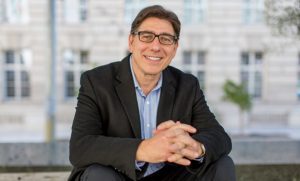David Faigman Advocates for the Legal System to Evolve with Science

David Faigman is a nationally recognized expert on evidence.
Faculty Who Lead: David Faigman
- In Scientific American, Chancellor & Dean David Faigman and Towson University Professor Jeff Kukucka argue that the legal system must change to keep up with our evolving understanding of science.
- Lyle and Erik Menendez were victims of abuse, and new science around trauma and violence urges their conviction to be reconsidered.
- Despite new evidence discrediting shaken baby syndrome, Robert Roberson remains on death row after being convicted in 2003 of killing his daughter.
- To Faigman and Kukucka, cases should be reopened when scientific understanding changes in the name of fairness and truth.
New research on the traumatic effects of childhood abuse has called into question the life-without-parole sentences for Lyle and Erik Menendez, the infamous brothers convicted of killing their parents. But the law doesn’t always keep up with the pace of scientific discovery.
Chancellor & Dean David Faigman and Towson University Professor Jeff Kukucka wrote two opinion pieces in Scientific American to urge the law to react nimbly to scientific developments. “With lives at stake, justice demands we shift quickly,” Faigman and Kukucka wrote.
The first article follows the efforts save Robert Roberson, a Texas man who was convicted of murdering his daughter in 2003 based on shaken baby syndrome, from death row.
Roberson would be the first person in the U.S. to be executed for a conviction based on shaken baby syndrome, they note. But as new research has debunked the theory, Faigman and Kukucka write that “justice requires that courts reexamine old convictions in light of new findings.”
The second Scientific American piece relates Roberson’s case to the life sentences for the Menendez brothers, pointing out the advances in science that may deem the cases’ rulings unfair by modern standards. According to Faigman and Kukucka, the law failing to change with mounting research “threatens the constitutional guarantee of due process.”
Put simply, “Science is constantly evolving, and when it reveals a past mistake, we do not simply resign ourselves to it; we take corrective action. Our legal system should be no different,” argue Faigman and Kukucka.
Faigman is a nationally recognized expert on evidence and co-author/co-editor of the five-volume treatise, “Modern Scientific Evidence: The Law and Science of Expert Testimony” (with Cheng, Murphy, Saks, Sanders & Slobogin).